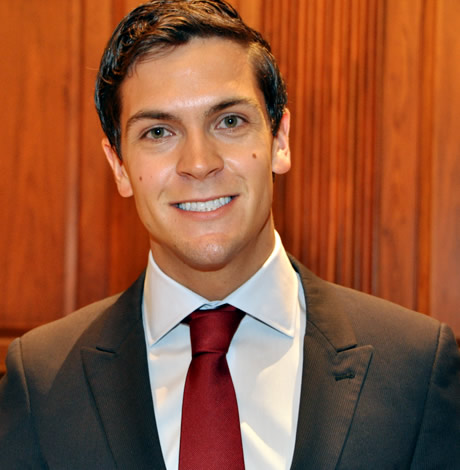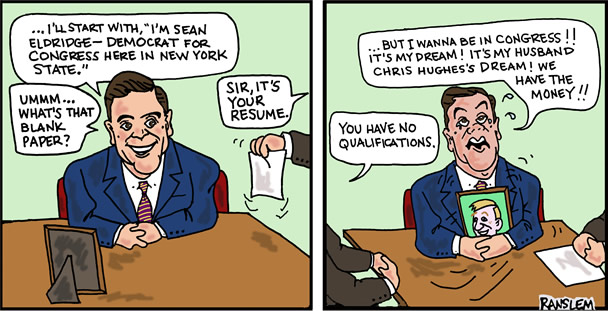Opinions
Gays behaving badly
Carpetbagging candidates and credit-stealing activists — is this what we fought for?


(Washington Blade cartoon by Ranslem)
A squabble broke out at the Equality Forum panel discussion of national politics I moderated last week in Philadelphia.
A woman in the audience objected forcefully after the Victory Fund’s Torey Carter discussed his organization’s controversial endorsement of two gay candidates for Congress.
One is Richard Tisei, a gay Republican from Massachusetts seeking to unseat pro-LGBT (but straight) incumbent John Tierney. The race is dividing LGBT voters and donors, with some saying we should remain loyal to our allies in Congress while others like the Victory Fund see an opportunity to add an openly gay voice to the GOP caucus.
The other race is in New York where the Victory Fund and other LGBT advocates are backing Sean Eldridge over a Republican incumbent who opposes marriage equality. The race is controversial because Eldridge has a thin resume but deep pockets — he’s married to Facebook co-founder Chris Hughes.
The woman at Equality Forum nearly leapt from her seat, angry at the notion of a candidate buying a seat in Congress and questioning whether the LGBT community should play along with such unsavory tactics.
Her frustration is certainly understandable. Eldridge embodies much of what is wrong with our modern political system, which prizes money over achievement. LGBT advocates should reconsider supporting Eldridge’s vanity campaign for Congress from New York’s 19th congressional district.
Or is it the 18th district? It’s hard to keep track of where Eldridge and his wealthy husband — who won the lottery by ending up Mark Zuckerberg’s college roommate as he was creating Facebook — are buying their latest multi-million-dollar home.
We should abandon the term “carpetbagging” and call it “Eldridgeing” because he gives new meaning to the cynical practice of picking up and moving to a new district to buy a seat in Congress.
Eldridge is taking on incumbent Rep. Chris Gibson, a Republican who opposes marriage equality but is a co-sponsor of the Employment Non-Discrimination Act. Of course, no one would mistake Gibson for a gay rights advocate — he earned a zero on HRC’s congressional scorecard — but gay voters and donors should resist lining up behind an alternative just because he’s gay and rich. Surely there’s a viable, experienced Democrat living in the district. We won’t know because anyone contemplating a run was scared off by the Hughes war chest.
In sharp contrast to most newbie politicians, Eldridge shuns the media. He has refused multiple Blade interview requests. Politico last month published a profile of Eldridge and noted that he not only refused its interview requests, but locked the campaign headquarters door when a reporter showed up knocking.
Despite Eldridge’s arrogant approach to campaigning, LGBT voices are embracing him.
“They are young, rich, smart and good-looking. It’s a pretty powerful combination,” Richard Socarides told the New York Times in a predictable display of sycophantic ass kissing.
There’s no disputing they are rich. Hughes’ net worth has been reported to be between $600-700 million. The money came from his connection to Facebook’s Zuckerberg. As the New York Times put it, “For Mr. Hughes, a history and literature student with no programming skills, it later seemed to outsiders a lucky break.”
The couple bought an estate in Garrison, N.Y. along with 80 acres in 2011 for $5 million, the Times noted, quoting Eldridge as saying that’s where they “put down roots.” But just two years later, when the congressional seat in that area appeared out of reach for Eldridge, they bought a new, $2 million spread just north in the 19th congressional district.
Eldridge is just 27 but has a “deep commitment” to public service, according to his bio on Victory Fund’s website. It continues, “He helped lead the successful campaign for marriage equality in New York State in 2011.” That’s almost as ridiculous and brazen as author Jo Becker comparing HRC’s Chad Griffin to Rosa Parks in her new book “Forcing the Spring.”
Much gnashing of teeth followed publication of the book last month. Part of the reason for the backlash is that the book played into a narrative of HRC swooping in at the 11th hour and taking credit for the work of grassroots activists. Many of them have complained (often privately and off the record, fearing retribution) of HRC’s tactics, from Maryland to Maine and California to New York.
We all know the marriage equality movement didn’t start in 2008 with the Prop 8 case and that Griffin is no Rosa Parks. In fact, that case fell far short of its goals; it’s an odd choice for Becker’s grandiose claims.
As gays find increasing acceptance and move openly into the halls of power, we mustn’t forget our own history, as HRC bet wrongly we would in the case of Becker’s book. That history has always been about a shared responsibility for helping each other overcome discrimination and hate. We all stand on the shoulders of a generation of gay men who died and the LGBT survivors who took care of them.
And, as the insightful Maya Rupert of the National Center for Lesbian Rights told our audience at the Equality Forum: We don’t need a gay Rosa Parks. The original belongs to everyone.
Kevin Naff is editor of the Washington Blade. Reach him at [email protected].
Opinions
Council must approve new Commanders stadium deal
An important catalyst for economic development

I am a strong supporter of the Commanders stadium deal at the RFK site. The Council members who understand economic development will vote “yes.”
Chairman Phil Mendelson, and some of the others, are smart. Despite the chair being peeved he wasn’t in on the negotiation, he will have some good ideas to tweak the deal, and will then get the seven members of the Council needed to pass it. While the deadline is July 15, there is a paragraph in the agreement reading it can be extended if both sides agree. Again, Mendelson is a smart guy. He will not pass up this incredible opportunity. Besides that, he recognizes it could happen without the Council if the president and Congress want it. It was NFL Commissioner Roger Goodell, and Commanders owner Josh Harris, who worked with the mayor, lobbying hard to get us the 180-acre site. Chances are, without their help, we wouldn’t have it. So, the deal will move forward, as it should, based on its merits.
The domed stadium proposed by the Washington Commanders for the 180-acre RFK site is only one part of the planned incredible economic development opportunity Mayor Muriel Bowser has negotiated. This was a dream of the mayor for 10 years, and she worked with Congress to get the site turned over to the District. This finally happened last year when Congress passed the D.C. Robert F. Kennedy Memorial Stadium Campus Revitalization Act. The legislation was signed into law by President Biden in January 2025. It gave the District the ability to develop the long-underutilized space for a mix of uses, lifting the restrictions that were in place under the previous lease. The legislation requires 30% of the RFK campus be reserved for parks and open space, not including a 32-acre riparian area along the Anacostia River.
Since the legislation was signed, the mayor worked closely with Josh Harris, principal owner of the Commanders, to negotiate the single largest private investment in the District’s history — a $2.7 billion investment from the Commanders. The mayor understands this investment will be the catalyst to activate 180 acres of what she has called ‘opportunity’ at the RFK campus. It is not only a sparkling new domed stadium. That will complement the transformation of the entire campus to include housing, parks and recreation, hotels, restaurants, retail, and neighborhood amenities.
The mayor understands the economy of D.C. is changing. Between the pandemic, and now reduction in federal workforce, the city has to change how we generate revenue. As the mayor said, “When we got control of 180 acres of land on the banks of the Anacostia, we knew right away that partnering with the Commanders would be the fastest, and surest, route to bringing the entire RFK campus to life. As we focus on the growth of our economy, we’re not only bringing our team home, but we’re also bringing new jobs and new revenue to our city, and to Ward 7.” We have seen what Nationals’ stadium did as the catalyst for that part of D.C. Remembering the fights over that stadium, and the fact the city, not the team, paid for it, we know it moved forward profitable development of the entire area by a minimum of 10 years.
Yes, it may be possible to redevelop this 180-acre site without a stadium; but it’s also clear it would take at a minimum at least 10 years longer, if ever, to do it without the Commanders investment. Under the terms of the deal, the Commanders will drive the investment of at least $2.7 billion to build a roofed stadium that can be used year-round, together with related improvements. The District will invest $500 million for stadium horizontal and non-vertical costs, paid for from the Sports Facilities Fee (formerly known as the Ballpark Fee). By leveraging dedicated funds from the Sports Facilities Fee, the District will not need to make cuts to the city’s operating budget. In addition, the District will facilitate parking development using a $175 million revenue bond, which will be funded by in-stadium activity once the stadium is operating. Events DC will contribute up to $181 million for parking garages near the community recreation facilities, which Events DC will own. Additionally, similar to other large development projects such as St. Elizabeths East, the District will invest $202 million for utilities infrastructure, roadways, and a WMATA transit study. The study will determine if at some time there might be new bus routes, or even an additional Metro stop. Let us remember there was a stadium there before and the RFK campus is today readily accessible by many public transit options.
The approximately 65,000-seat stadium, expected to open in 2030, will occupy only 11% of the site. In addition to building the stadium, the Commanders will be responsible for activating and developing multiple parcels of land around the stadium. Those will include restaurants, entertainment venues, hotels, housing, green space, and more. The entire campus is expected to create approximately 5,000-6,000 housing units, of which at least 30% being affordable housing.
Throughout the construction process, the District will seek to preserve and continue to operate the popular Fields at RFK. The District will invest an additional $89 million to build a new sportsplex to host year-round sporting events and tournaments for youth in D.C. The mayor’s Fiscal Year 2026 budget proposal will include $89 million for the sportsplex. Adjacent to the fields, park space, and sportsplex, the District will develop a new Kingman Park District, which will include housing, mixed-use development, open space, and recreational space. To do this, the campus planning effort, will be taking all the development parcels through the D.C. 2050 Comprehensive Plan update. In this way, community members and neighbors will have an opportunity to weigh in on what types of uses would best serve the community. All parcels in the Kingman Park District will go through the District’s RFP process and prioritize local businesses.
As the economy of the District changes, the mayor and Council must be
focused on responding to the shifts. Activation of the RFK campus through this deal is expected to create approximately 14,000 jobs in connection to the stadium construction alone, and 2,000 permanent jobs. The stadium and surrounding development are anticipated to create approximately $4 billion in total tax revenue, and yield more than $15.6 billion in direct spending over 30 years.
The District has a successful history of using catalytic sports investments to transform underutilized spaces into vibrant neighborhoods, including in Chinatown-Gallery Place with Capital One Arena (originally the MCI Center); Capitol Riverfront with Nationals Park; and St. Elizabeths East with the CareFirst Arena (originally the Entertainment and Sports Arena) in the past decade. During her time in elected office, the mayor has worked on successful deals for Audi Field, the CareFirst Arena, the renovation of Capital One Arena, and now this partnership with the Washington Commanders.
Again, Mendelson will have some good ideas that he will want to negotiate into the agreement as it moves through the Council. But the overall positive impact of this deal on the District’s economy will win the day. He, and many Council members, understand major sports are a significant driver of the District’s new economy, generating $5 billion in 2022 and attracting 7.4 million visitors in 2023. The fact is D.C.’s sports teams and their facilities have boosted neighborhood investment, with nearby commercial development outpacing the rest of the city, after each facility opened.
This is a once-in-a-lifetime deal for D.C. I urge everyone to contact your Council member, and tell them to vote yes.
Peter Rosenstein is a longtime LGBTQ rights and Democratic Party activist.
Opinions
PDAB: A mysterious acronym that could affect your health
We must make medications affordable without sacrificing access

As the executive directors of LGBTQ+ advocacy orgs in nearby states, we share an unshakeable commitment to the wellbeing of our communities. This commitment drives us and our organizations to advocate for health care affordability and accessibility, whether for gender-affirming health care and HIV treatment, or simple prevention measures and non-discrimination. And, it is why we oppose giving unaccountable advisory boards the power to set prices, and therefore threaten access, to critical, life-saving drugs such as HIV treatment medication.
The LGBTQ+ community loves acronyms, but there’s one that we wish more people knew about: PDAB. A Prescription Drug Affordability Board is an appointed board that reviews the cost of some prescription drugs and determines if they are affordable. While this sounds good, the reality is that these boards may actually limit access to some important drugs, or even cause new affordability problems for patients. Plus, they have done little to consider patient or community input or demonstrate true accountability to the communities affected by their decisions – like our friends and family members living with HIV.
Our organizations continue to raise concerns about PDABs and their expansion because of our serious concerns about their potential impact on LGBTQ+ people and people living with HIV and other chronic conditions. In fact, Virginia’s governor recently vetoed a bill that would have created a prescription drug affordability board. In his veto statement, Gov. Youngkin said: “This legislation risks limiting patient access to essential medication by prioritizing costs over medical necessity. Affordability of prescription drugs is a critical issue, but this proposal would instead compromise patient welfare in the Commonwealth of Virginia.”
Maryland’s PDAB was created in 2019 and has yet to bring down costs, even for those in the state health plans. FreeState Justice advocated against expanding the board’s scope to potentially set “upper payment limits” or UPLs for drugs purchased by state and local government health plans. UPLs can easily backfire and decrease access for many patients. We are particularly concerned about the potential unintended consequences of actions by these boards.
Because LGBTQ+ communities are disproportionately affected by HIV, our organizations advocate for the rights, equality, and well-being of people living with HIV. Thanks to significant advancements in science and treatment, HIV is now a manageable chronic illness. But only if we maintain access to the medications that people living with HIV rely on.
Beyond HIV, LGBTQ+ people experience higher needs for health care and steeper barriers to access than other populations. Almost half, or 47 percent, of LGBTQ+ people have a medical condition that requires monitoring or medication. And, LGBTQ+ people are more likely to delay or go without care due to cost issues. That is why PDABs, and in particular, upper payment limits, could exacerbate health disparities for the LGBTQ+ community.
In the handful of states with PDABs, these boards have made decisions that impact patients living with chronic conditions, including HIV– often without considering comments from advocates, patients and providers, or the programs that support patients in accessing and affording these treatments.
Programs like the AIDS Drug Assistance Program and other supports help make the cost of HIV treatments affordable for patients. These programs were hard-won by advocates, who for years have held fast to the mantra: nothing about us, without us. This principle of HIV advocacy is directly opposite of what PDABs do: empower an appointed board of experts to make decisions about the affordability of HIV medications without any input from people living with HIV.
In February, the Oregon PDAB heard many stakeholder comments on the importance of preserving access to HIV treatment. Advocates explained how drug assistance programs work and why patients need access to as many treatment options as possible. Despite this strong testimony, the board chose to review an HIV medication, Odesfey, against community recommendations.
Today many communities including people living with HIV are concerned and fearful about the serious impacts of federal funding cuts to health care. State PDABs are a costly tool, and they have not produced the savings they promised. This is a moment to preserve access and stabilize the system, and avoid any changes that could jeopardize the care people need.
There’s so much at stake for our communities when it comes to access to health care. We do need to address the high cost of prescription drugs, but there are better ways to do it that earnestly incorporate community input and take a more comprehensive look at the complex health care system. Our organizations are ready to bring LGBTQ+ people and people living with HIV into the discussion. By bringing patients, healthcare providers, and policymakers to the same table, we can come up with better solutions that truly make medications affordable without sacrificing access. Our north star is clear: a healthcare system that listens to all voices and makes sure everyone gets the care we need to thrive.
Phillip Westry is executive director of FreeState Justice in Maryland and Narissa Rahaman is executive director of Equality Virginia.
Opinions
TRAITOR: Treasury Secretary Scott Bessent has blood on his hands
Nation’s highest-ranking gay public official is a MAGA sell out

It’s an odd dichotomy: President Trump appoints the highest-ranking openly gay government official in history in Treasury Secretary Scott Bessent, yet he launches cruel attacks on transgender Americans.
Make no mistake: Those attacks are claiming lives. Trans people are killing themselves. I know of one trans person who died by suicide on Election Night, overwhelmed by fear of the incoming administration. Trump’s attacks have driven trans Americans and their families to flee the country and move to Canada, as the Blade has reported.
None of this is hypothetical or melodramatic. It’s real life and happening everywhere.
And so when Bessent was confirmed as Treasury Secretary, I wrote an op-ed urging him to educate Trump about the plight of trans Americans and the destructiveness of the attacks on the community. I waited 90 days for some sign that Bessent has a heart or at least a modicum of decency but sadly, I must report that he does not.
The attacks on the LGBTQ community under Trump keep coming. Last week’s news that the U.S. Department of Health and Human Services is planning to retire the national 988 crisis lifeline for LGBTQ youth on Oct. 1 is just the latest evidence that this administration doesn’t just dislike us — they want us dead.
“Ending the 988 Suicide and Crisis Lifeline’s LGBTQ+ youth specialized services will not just strip away access from millions of LGBTQ+ kids and teens — it will put their lives at risk,” Trevor Project CEO Jaymes Black said in a statement.
The service for LGBTQ youth has received 1.3 million calls, texts, or chats since its debut, with an average of 2,100 contacts per day in February.
Make no mistake: cutting this service will kill young LGBTQ people.
Just a couple of weeks earlier, Trump’s administration announced the Office of Infectious Disease and HIV/AIDS Policy would be gutted.
“In a matter of just a couple days, we are losing our nation’s ability to prevent HIV,” said HIV+Hepatitis Policy Institute Executive Director Carl Schmid.
And prior to that, Trump issued a series of executive orders targeting the trans community — restricting access to affirming healthcare, banning trans service members from the military, barring trans women and girls from playing sports, eliminating the “X” gender marker on passports, and barring students assigned male at birth from using women’s restrooms.
Let’s be very clear: When you deny someone the ability to use the bathroom, you deny their humanity.
So back to Scott Bessent, the billionaire hedge fund manager now running our economy into the ground. As many Trump protesters have noted: silence is complicity. And Bessent has been silent on all of these horrific attacks on trans Americans and their basic humanity. He is spineless and a traitor to the LGBTQ community.
Bessent runs the U.S. Treasury and reportedly has Trump’s ear on all matters related to the economy. He could easily push Trump in a better, more compassionate direction, yet there is no evidence he has done that.
“The LGBTQ+ community is counting on openly LGBTQ+ nominees like Scott Bessent to step up for the community,” said Human Rights Campaign President Kelley Robinson after the inauguration. Sadly, it’s become clear we cannot count on Bessent. As I wrote in January, Trump likes his queer people gay, white, cis, rich, and obedient.
Bessent has ignored the Blade’s interview requests. (And after this is published, I have no illusions he will change his mind.) The mainstream media, increasingly cowed by Trump, have failed to ask Bessent even the most basic questions about his views on trans equality and Trump’s attacks.
As a member of the LGBTQ community, Bessent has a responsibility to at least speak up on behalf of trans people who are suffering. But Republicans today have lost their spines. They genuflect before their Dear Leader, line their own pockets, and leave the rest of us to deal with the consequences.
The crisis is real. People are dying. Trans people especially are suffering. The rest of us must do what we can to mitigate that suffering and to speak out in defense of our trans friends.
Kevin Naff is editor of the Washington Blade. Reach him at [email protected].
-

 The Vatican14 hours ago
The Vatican14 hours agoAmerican cardinal chosen as next pope
-

 a&e features20 hours ago
a&e features20 hours agoYour guide to the many Pride celebrations in D.C. region
-

 U.S. Supreme Court2 days ago
U.S. Supreme Court2 days agoSupreme Court allows Trump admin to enforce trans military ban
-

 District of Columbia2 days ago
District of Columbia2 days agoWorldPride permits for National Mall have yet to be approved












